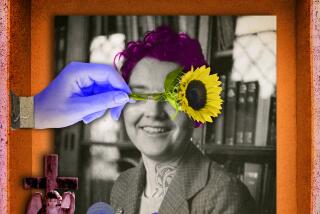Forever Feather: A Father’s Memoir
- Share via
When Robert Peters picked up Richard from preschool on that sunny-yet-cool afternoon in Michigan 37 years ago, his son’s teacher told Peters, “He’s been unusually quiet today.”
The 4-year-old, nicknamed Feather because his young sister couldn’t pronounce the word “brother,” handed his father a valentine. The construction-paper heart declared “I love Daddy” in a childish scrawl.
As they walked home, Peters grew concerned over his son’s unusual silence, and as they approached their front door, the normally energetic boy complained that he had a stomachache.
Before day’s end, Feather was dead.
The sudden, shocking death of his young son--due to meningitis, according to an autopsy--provides the haunting backdrop for the fourth in a series of memoirs that Peters, a poet and retired UC Irvine professor of English, has written for the University of Wisconsin Press.
Kirkus Reviews calls “Feather: A Child’s Death and Life” “strangely affecting, a lyrical collage of memories surrounding a 4-year-old’s brief life and sudden death.”
In a series of impressionistic vignettes--”snapshots” as Peters labels them in the book--he paints vivid portraits of his family during the time he was a struggling young academic and father of three young children.
In one, “Snapshot of Turkey as Family Member,” Peters, a former farm boy, feels his children’s education is somehow lacking without the experience of seeing a turkey killed for their Thanksgiving meal. So he brings home a live tom, which Feather promptly dubs Gobble, and which prompts Peters’ wife, Jean, to snap, “You really did it this time!”
A bittersweet “Snapshot of the Execution” follows.
During one particularly joyful account of a wintertime outing to a nature preserve, the children frolic on a frozen lake. It’s only days before Feather’s death.
A framed photograph of Feather and his older brother and sister taken that day is among a gallery of photos on the dining room wall in Peters’ Huntington Beach home. (The grinning, black-haired boy in the photo, clad in a plaid wool coat, mittens, unbuckled overshoes and winter hat with furry ear-flaps, adorns the book’s cover.)
But Peters, 72, says he needn’t look at a photograph to conjure up an image of the son who most resembled him.
“I’ve never felt that he’s left me,” says Peters. “I don’t know how universal this is for people who have lost small children or loved ones, but I like to think they become nourishing presences and that we no longer have to feel guilt or self pity or sorrow that they aren’t here.
“At least in my case, the boy has never gone away. When I want to see him I can. I see him wearing the same fur cap and coat he wore on that last outing a few days before he died. He’s here, and he’s happy. That’s how he nourishes me, I think.
“It’s always a positive presence.”
*
Peters, then a professor of Victorian literature at Wayne State University in Detroit, was home with a touch of the flu that February day in 1960 when he picked up his son up from preschool.
When they arrived home, Feather was running a slight temperature. He said he wasn’t hungry when his mother offered him some lunch, and Peters took him upstairs to put him to bed. After putting on his flannel pajamas covered with tugboats and climbing into bed, Feather asked his father to give him Seal, a large stuffed animal.
“Want me to join you?” Peters asked. “We’ll sleep off our bugs together.”
They spent the afternoon in bed together, alternately napping and reading--Peters reading Thomas Mann’s “The Magic Mountain” and then reading Feather’s favorite children’s books to him.
At six in the evening, Peters asked Feather if he wanted to go downstairs with him to have supper. The boy’s stomach ache appeared to be gone, but he declined. Then, recalls Peters, “He turned over and said, ‘I love you, Daddy.’ I thought he was just going off to sleep.”
Later in the evening when he checked on Feather, Peters was startled to find the boy lying on his face--a position, Peters writes, “he almost never assumes.
“I turn him, noting an awful inertness. His lips, fever-cracked, are ajar, distorted in the corners where the bluish skin doesn’t quite meet. . . . His eyes are half-open, his irises inky and frosty. Though his neck is warm, his limp hand and arm are chilled. I discern no pulse. . . .”
Recalls Peters: “I called the police immediately and they sent out a resuscitation team. They couldn’t do anything, so they took him to the local hospital.”
But by then, Peters says, “He was already gone. . . . I watched them. They opened up his chest and tried to massage his heart, and nothing worked.”
It took weeks before the couple received the autopsy results saying that meningitis had killed their son.
He recalls that when their son complained of having a stomachache that day, his wife sensed something more.
“Women, I think, sometimes have a special sense that fathers don’t have, and she wanted to get the doctor,” he says. “But the doctor wouldn’t see him.”
Adds Peters: “The doctor was busy playing golf. He said, ‘Don’t be hysterical, Mrs. Peters. It’s not serious.’ ”
The couple considered filing a malpractice suit but did not--they felt the courtroom odds at the time were stacked too strongly in favor of the medical community.
So, he says, “We just had to lick our wounds.”
Peters first wrote about his son’s death in “Songs for a Son,” his first book of poems, which was published by W.W. Norton in 1967.
“I started writing them a few days after he died as a way of keeping sane,” he says. “I wrote about 20 poems just trying to recall him in that last outing and some about the experience of the death too.”
Losing Feather took an emotional toll on the entire family. Peters says his son’s death “precipitated a lot of things” in his marriage.
“I decided I’d lived lots of lies in my life,” he says. “I opted to follow through on powerful gay drives I’d had all my life.”
In 1973, after 17 years of marriage, he and his wife were divorced.
In 1988, the Wisconsin University Press, which was publishing a series of nonfiction books with Wisconsin settings, published Peters’ first memoir, “Crunching Gravel: a Wisconsin Boyhood in the Thirties,” an unsentimental look at his family’s struggle for survival on a small farm.
The book garnered glowing reviews and did so well, Peters says, that his publisher asked him to write more memoirs.
He wrote “Nell’s Story: A Woman From Eagle River,” a story told in his sister’s voice of her struggle as a young mother with illegitimate children.
That was followed by “For You, Lili Marlene: A Memoir of World War II,” the story of Peters being drafted into the Army and ending up in Europe, where he tried to discover who he was sexually and as a man.
Although writing the poems contained in “Songs for a Son” proved cathartic 30 years ago, Peters says, writing his latest memoir did not.
“It’s very curious how you’d think such a subject that is so painful would be very hard to write,” he says, adding, “I didn’t shed a tear writing this book.
“I really don’t linger over the whole death experience, I suppose, because I’ve exorcised it so much by the writing I’ve done about it.” He adds, however, “It’s still, I suppose, like a psychological need I’ve had all these years to write about it.”
As a literature professor, Peters says he was “steeped in Greek tragedy and gloomy writers. I know I’ve felt all my life very strongly you have to kick back in some ways. I don’t mean relax, but do your karate chop or whatever at the fate you can’t see, can’t describe, and yet is some kind of force that has taken something precious from you.”
Despite his loss, Peters says he feels blessed in life. He has had a longtime relationship with writer Paul Trachtenberg. And he remains close to his three children--Meredith, a United Nations librarian in Switzerland; Rob, who teaches biology at Kansas Wesleyan University in Salina, Kan., and Jefferson, who teaches English at a university in Japan.
“I see Feather’s place in all this as very important, like a presence or energy that enriched that life a lot,” says Peters. “I’ve done all I can to celebrate his having been here. And, of course, I wanted my children to have a sense of the continuity of his life.”
When Feather died, Peters and his wife had his remains cremated.
Not knowing what to do with his son’s ashes, Peters kept the imitation-leather box that held them hidden behind books in his study at Wayne State University.
There they remained for five years.
Finally, a week before he left Detroit to take a job at UC Riverside in 1965, Peters decided to bury the ashes on the grounds of a Unitarian church in the Detroit suburb of Bloomfield Hills.
Peters dug a hole and buried the ashes himself next to a beech sapling that had been planted a few months earlier.
Since then, the ashes of other church members have been buried beneath what the church now calls the Tree of Life.
In 1992, Peters and his youngest son, Jefferson, who was born a year and seven months after Feather died, visited the church grounds where the sapling beech tree had grown to more than 30 feet tall.
“It was great to have him see the spot,” recalls Peters, who ends the book with a picture of the two of them standing side-by-side beneath the tree. “It’s like making the connection in the end that the life of Feather, in a sense, continues through Jefferson.”
Peters will read and sign “Feather: A Child’s Life and Death” at 7 p.m. today at Barnes & Noble in Metro Pointe, 901 South Coast Drive, Costa Mesa.
More to Read
Sign up for our Book Club newsletter
Get the latest news, events and more from the Los Angeles Times Book Club, and help us get L.A. reading and talking.
You may occasionally receive promotional content from the Los Angeles Times.










